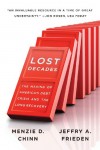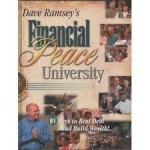Recently Added Videos
A clear, authoritative guide to the crisis of 2008, its continuing repercussions, and the needed reforms ahead.
The U.S. economy lost the first decade of the twenty-first century to an ill-conceived boom and subsequent bust. It is in danger of losing another decade to the stagnation of an incomplete recovery. How did this happen? Read this lucid explanation of the origins and long-term effects of the recent financial crisis, drawn in historical and comparative perspective by two leading political economists.
By 2008 the United States had become the biggest international borrower in world history, with more than two-thirds of its $6 trillion federal debt in foreign hands. The proportion of foreign loans to the size of the economy put the United States in league with Mexico, Indonesia, and other third-world debtor nations. The massive inflow of foreign funds financed the booms in housing prices and consumer spending that fueled the economy until the collapse of late 2008. This was the most serious international economic crisis since the Great Depression of the 1930s.
Menzie Chinn and Jeffry Frieden explain the political and economic roots of this crisis as well as its long-term effects. They explore the political strategies behind the Bush administration’s policy of funding massive deficits with foreign borrowing. They show that the crisis was foreseen by many and was avoidable through appropriate policy measures. They examine the continuing impact of our huge debt on the continuing slow recovery from the recession. Lost Decades will long be regarded as the standard account of the crisis and its aftermath.
About 1.5 million households filed bankruptcy in the last year, making bankruptcy as common as college graduation and divorce. The recession has pushed more and more families into financial collapse—with unemployment, declines in retirement wealth, and falling house values destabilizing the American middle class. Broke explores the consequences of this unprecedented growth in consumer debt and shows how excessive borrowing undermines the prosperity of middle class America.
While the recession that began in mid-2007 has widened the scope of the financial pain caused by overindebtedness, the problem predated that large-scale economic meltdown. And by all indicators, consumer debt will be a defining feature of middle-class families for years to come. The staples of middle-class life—going to college, buying a house, starting a small business—carry with them more financial risk than ever before, requiring more borrowing and new riskier forms of borrowing. This book reveals the people behind the statistics, looking closely at how people get to the point of serious financial distress, the hardships of dealing with overwhelming debt, and the difficulty of righting one’s financial life. In telling the stories of financial failures, this book exposes an all-too-real part of middle-class life that is often lost in the success stories that dominate the American economic narrative.
Authored by experts in several disciplines, including economics, law, political science, psychology, and sociology, Broke presents analyses from an original, proprietary data set of unprecedented scope and detail, the 2007 Consumer Bankruptcy Project. Topics include class status, home ownership, educational attainment, impacts of self-employment, gender differences, economic security, and the emotional costs of bankruptcy. The book makes judicious use of illustrations to present key findings and concludes with a discussion of the implications of the data for contemporary policy debates.
Box have light wear. contains Fincancial Peace Revisited in new condition, Financial Peace University Book (which is in used condition with writing and markings), 13 Life Changing Lessons on Audio CD w/2 Bonus CDs, sealed bonus pack CD, envelope system and 2 Debit Card Holders. Box does NOT include the workbook nor budegeting forms.
In a nation whose debt has outgrown the size of its entire economy, the greatest threat comes not from any foreign force but from Washington politicians who refuse to relinquish the intoxicating power to borrow and spend. Senator Tom Coburn reveals the fascinating, maddening story of how we got to this point of fiscal crisis—and how we can escape.
Long before America’s recent economic downturn, beltway politicians knew the U.S. was going bankrupt. Yet even after several so-called “change” elections, the government has continued its wasteful ways in the face of imminent danger. With passion and clarity, Coburn explains why Washington resists change so fiercely and offers controversial yet commonsense solutions to secure the nation’s future.
At a time when millions of Americans are speculating about what is broken in Washington, The Debt Bomb is a candid, thoughtful, non-partisan exposé of the real problems inside our government. Coburn challenges the conventional wisdom that blames lobbyists, gridlock, and obstructionism, and places the responsibility squarely where it belongs: on members of Congress in both parties who won’t let go of the perks of power to serve the true interests of the nation—unless enough citizens take bold steps to demand action.
“Democracy never lasts long. It soon wastes, exhausts, and murders itself. There was never a democracy yet that did not commit suicide.” —John Adams
Throughout a distinguished career as a business owner, physician, and U.S. senator, Tom Coburn has watched his beloved republic careen down a suicidal path. Today, the nation stands on the precipice of financial ruin, a disaster far more dangerous to our safety than any terrorist threats we face. Yet Coburn believes there is still hope—if enough Americans are willing to shake the corridors of Washington and demand action.
With an insider’s keen eye and a caregiver’s deft touch, Coburn diagnoses the mess that career politicians have made of things while misusing their sacred charge to govern.
Coburn’s incisive analysis:
Reveals the root causes of America’s escalating financial crisis Exposes Washington’s destructive appetite for wasteful spending, power grabs, backroom deals, and quick non-fixes Rises above partisanship to implicate elected officials of all stripes in steering the nation off course Lays out a commonsense guide to restoring order Concludes with a clarion call and sound advice for Americans who would dedicate themselves to defusing the debt bomb
Above all, Coburn believes the United States can continue as a beacon of opportunity for future generations—but how we act today will determine whether we deliver the nation to our children and grandchildren fully alive, on life support, or without a pulse.
Since first edition’s publication, the CDO market has seen tremendous growth. As of 2005, $1.1 trillion of CDOs were outstanding — making them the fastest-growing investment vehicle of the last decade. To help you keep up with this expanding market and its various instruments, Douglas Lucas, Laurie Goodman, and Frank Fabozzi have collaborated to bring you this fully revised and up-to-date new edition of Collateralized Debt Obligations. Written in a clear and accessible style, this valuable resource provides critical information regarding the evolving nature of the CDO market. You’ll find in-depth insights gleaned from years of investment and credit experience as well as the examination of a wide range of issues, including cash CDOs, loans and CLOs, structured finance CDOs and collateral review, emerging market and market value CDOs, and synthetic CDOs. Use this book as your guide and take advantage of this dynamic market and its products.
Product Features
- Collateralized Debt Obligations
- Structures
- Analysis
A comprehensive, current survey of investment products and instruments
Thorough, accessible, and up to date, Financial Instruments is a guide to all of the financial products currently being traded in the world’s markets. Through plain language and in a user-friendly format, David M. Weiss, author of After the Trade Is Made, outlines the many tools available and their unique functions, features, and structures.
Weiss breaks financial instruments into four broad groups: equities, debt, derivatives, and mutual funds. Under each heading, he explores the many types of related products, including exotic investments such as:
? American Depositary Receipts
? Asset-Backed Securities
? Structured Debt
? Futures
? Swaps
? Unit Investment Trusts
Financial Instruments is an indispensable tool for finance professionals-portfolio managers, brokers, financial planners, and institutional investors. It’s also a definitive resource for sophisticated individual investors.
Product Features
- Used Book in Good Condition
Lillian Fitzgerald has made a terrible mistake. She’s gone a hundred thousand dollars into student loan debt for a Master’s Degree in Creative Writing, only to discover that she might not actually be a good writer.
In an attempt to buy herself enough time to salvage her ambitious but depressing thesis novel, she accepts a part-time job doing SAT tutoring for Calvin Bolt, whose father Henry owns Bolt Bank, the very company that services her student loans. But Lillian soon discovers that dangerous secrets underlie the wealth and power of the Bolt family, secrets that could launch Lillian onto the bestseller list…if she manages to survive long enough to write about them.
In DEBT, Rachel Carey’s sharp, fast-paced satire of New York during the 2008 financial meltdown, it turns out that everyone, even all-powerful billionaire Henry Bolt, is in somebody’s debt.
Product Features
- Used Book in Good Condition
Mainstream economists tell us that developing countries will replicate the economic achievements of the rich countries if they implement the correct “free-market”policies. But scholars and activists Toussaint and Millet demonstrate that this is patently false. Drawing on a wealth of detailed evidence, they explain how developed economies have systematically and deliberately exploited the less-developed economies by forcing them into unequal trade and political relationships. Integral to this arrangement are the international economic institutions ostensibly created to safeguard the stability of the global economy—the International Monetary Fund (IMF) and the World Bank—and the imposition of massive foreign debt on poor countries. The authors explain in simple language, and ample use of graphics, the multiple contours of this exploitative system, its history, and how it continues to function in the present day.
Ultimately, Toussaint and Millet advocate cancellation of all foreign debt for developing countries and provide arguments from a number of perspectives—legal, economic, moral. Presented in an accessible and easily-referenced question and answer format, Debt, the IMF, and the World Bank is an essential tool for the global justice movement.
From personal finance and consumer spending to ballooning national expenditures on warfare and social welfare, debt is fundamental to the dynamics of global capitalism. The contributors to this volume explore the concept of indebtedness in its various senses and from a wide range of perspectives. They observe that many views of ethics, citizenship, and governance are based on a conception of debts owed by one individual to others; that artistic and literary creativity involves the artist’s dialogue with the works of the past; and that the specter of catastrophic climate change has underscored the debt those living in the present owe to future generations.










